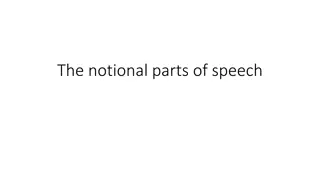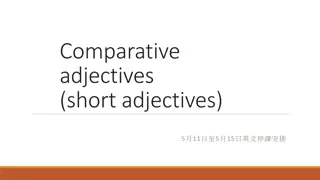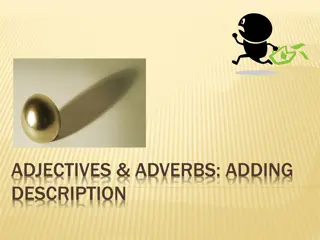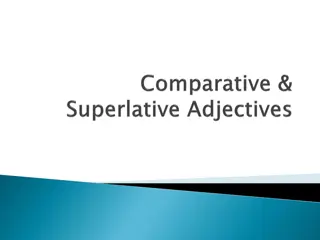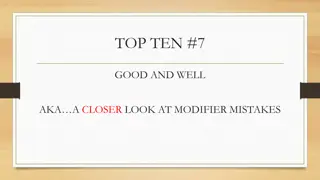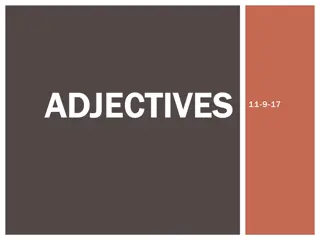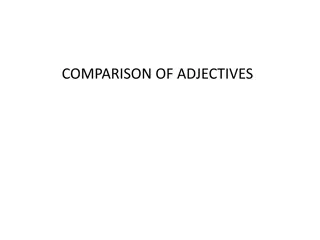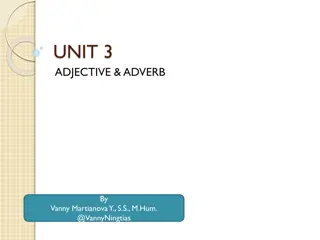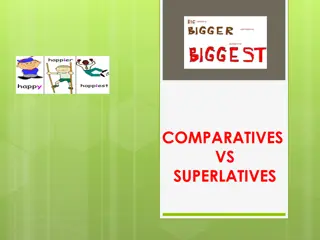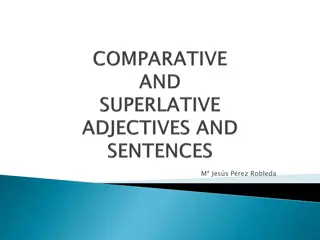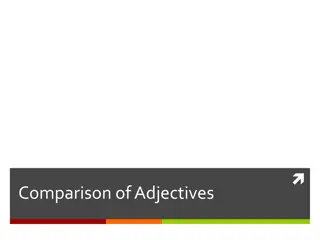Understanding Degrees of Comparison and Adjectives
Explore the three degrees of comparison in English grammar - positive, comparative, and superlative. Learn how adjectives describe nouns/pronouns and how to differentiate between them. Get insights on forming comparative and superlative degrees and their usage in sentences.
Download Presentation

Please find below an Image/Link to download the presentation.
The content on the website is provided AS IS for your information and personal use only. It may not be sold, licensed, or shared on other websites without obtaining consent from the author. Download presentation by click this link. If you encounter any issues during the download, it is possible that the publisher has removed the file from their server.
E N D
Presentation Transcript
Identity Md. Rafi Uddin Shamim Lecturer (English) Mohammadpur Anowar Ali Islamia Alim Madeasa Mohammadpur, Chatlhil, Noakhali. Cell: 01837526799 Email: idbshamim@gmail.com Class : VIII, IX-X Subject: English 2nd Paper
Look at the images, guess what these mean Old Older Oldest
Tall Taller Tallest
What is our todays topic? Our today s topic is Comparison of Adjective
Degrees of Comparison There are three degrees of comparison - positive degree, comparative degree, and superlative degree.
The positive degree is the normal adjective form. You use this form when describing one thing or a group of things. For example: 1. Sabiha s backpack is really heavy! 2. Nila is a beautiful girl. 3. Kamal is a good player in his class. Heavy, Beautiful, good are adjectives in the positive degree.
The comparative degree is used to compare two people, places, or things. The word "than" typically follows the comparative form. For example: Suma's backpack is heavier than Pedro's backpack. Shipon is more brilliant than Ripon. You are taller than Jim. Heavier, more brilliant, tallerare adjectives in the comparative degree.
The superlative degree can be used if you are comparing three or more people, places, or things. The word "the" typically comes before the superlative form. For example: The heaviest backpack belongs to Luna, because she never cleans it out! Jaky is the best boy I have ever seen. The Padma is one of the biggest rivers in our country. heaviest, best, biggest are adjectives in the superlative degree.
What is adjective? Adjective is a part of speach. Adjective is a word that describes a noun or pronoun That means an adjective gives more information about a noun or pronoun. Either its may be positive or negative
Rule Positive Comparative Form Superlative Form ____ small cool big ____+er smaller cooler bigger ____+est smallest coolest biggest One-syllable adjectives ____ lazy pretty ____change "y" to "i" + er lazier prettier ____change "y" to "i" + est laziest prettiest Two-syllables adjectives ending in -y ____ more/less ____ more intelligent more charming most/least ____ most intelligent most charming Adjectives with two or more syllables intelligent charming good bad better worse best worst Irregular adjectives
Rules of changing from Positive to Comparative degrees 1. No other change to any other Example: P> No other cities in Bangladesh are as big as Dhaka. C> Dhaka is bigger than any other cities in Bangladesh. P> No other boy is as active as he. C> He is more active than any other boy. P> No other boy in the class is as meritorious as he C> He is more meritorious than any other boy in the class.
Very few Change to most other Example: P> Very few metals are as precious as gold. C> Comparative: Gold is more precious than most other metals. P> Very few poets are as famous as Rabindranath Tagore. C> Rabindranath Tagore is more famous than any other poets. P> Very few problems are as serious as illiteracy. C> Illiteracy is more serious than most other problems.
As+ soon +as change to No sooner had+ past perfect tense than+ Past simple tense Example: P> As soon as the doctor came the patient felt better. C> No sooner had the doctor come than the patient felt better. P> As soon as I saw the thief he ran away. C> No sooner had I seen the thief than he ran away. P> As soon as the thief saw the police, he ran away. C> No sooner had the thief seen the police than he ran away.
if, As+ adjective +as then the answer will be Negative Example: P> Akbar is as strong as a tiger. C> A tiger is not stronger than Akbar. P> He is as cleaver as your brother. C> Your Brother is not cleverer then he. P> This is as beautiful as my pen. C> My pen is not more beautiful than this pen.
Evaluation 1. No other boy is as active as he. 2. Very few problems are as serious as illiteracy. 3. As soon as the doctor came the patient felt better. 4. Akbar is as strong as a tiger.
Home Work 1. Ali is as tall as Koli (Comparative). 2. A bird cannot fly as first as a plane (Comparative). 3. No other boy in the orphanage is as good as Jerry (Comparative). 4. Very few metals are as precious as gold. (Comparative) 5. As soon as she saw it, she knew that it must be Jim s. (Comparative) 6. Eagle s eyes were not as bright as hers. (Comparative)


